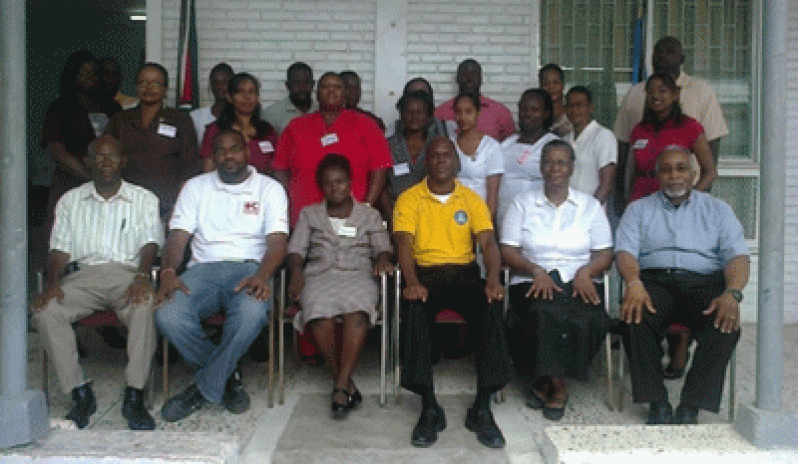THE Civil Defence Commission (CDC) continues its efforts at having officials trained in various aspects of disaster management with the aim of boosting the country’s responsiveness in the event of a catastrophe.
 These efforts continued yesterday as officials from Region 4 began training in Shelter Management and others areas at CDC Headquarters, Thomas Lands.
These efforts continued yesterday as officials from Region 4 began training in Shelter Management and others areas at CDC Headquarters, Thomas Lands.
The two-day shelter management training will entail an overview of risk management, the country’s national programme, shelters, shelter administration, shelter operations and problem solving.
Additionally, at the end of the training, participants will be engaged in a simulation exercise, testing what they would have learnt.
Operations and Training Officer CDC, Major Kester Craig, at the opening ceremony said that the CDC, as a disaster management organisation, is pleased to have representatives from the Regional Democratic Council of Region 4 to conduct a series of training.
Tomorrow and Friday, the training will continue with damage assessment and in the following week, emergency operations centre management, Craig said.
Using the 2005 floods as a point of reference, Craig informed participants that such training is necessary as it is realised that losses and damage and the issue of emergency response coordination are important.
“Because of the impact of the 2005 floods, the Civil Defence Commission, in collaboration with several partners, has decided to develop plans, policies, and strategies to effectively manage any disaster,” Major Craig said.
While a number of those have been formulated at the national and regional levels, Craig indicated that some are currently being implemented so as to reduce loss, damage and the impact of any disaster.
“In the case of Guyana, our major hazard is flooding… we are not as unfortunate as some other countries that are being battered by earthquakes, tsunamis and those catastrophic types of hazards,” Major Craig explained.
Craig highlighted that training with Region 4 officials is deemed necessary as the region has the highest population density, accounting for 4.1% of the population and 1% of the land area.
“Another characteristic of Region 4 that makes it wider is the fact that it is one of the three regions below the sea level,” Major Craig explained.
With this in mind, he indicated that it is necessary to have a pool of trained personnel so that the impact of any disaster can be reduced in the event one is to occur.
“We may not be able to mitigate flooding, but whenever it comes we must be prepared…in such instances, many persons will be displaced, therefore the need to have shelters and persons trained to manage those shelters,” Major Craig emphasised.
He indicated that at the end of the training, persons will be identified to be further trained as trainers, so that continued capacity building can be maintained across a broad spectrum, which means that each region’s capacity will now be boosted.
Within recent times, the CDC has been occupied with executing their agenda which sees them hosting a number of capacity building sessions with key stakeholders, both at the national and regional levels.
Earlier in the year, the national and regional plans, policies and response mechanisms were tested at the table top exercise Floodgate 2012.
As the Commission continues to execute its mandate, the country will soon benefit from a national public education campaign on disaster risk management, which targets various groups to bring them ‘up to speed’ with what government has been doing, the plans that are in place, and what is required of them, during a disaster.
For the remainder of the year, training sessions will be done in the same subject areas in Region 6 in October, Regions 7 and 10 in November and in Region 1 in December.




.jpg)










